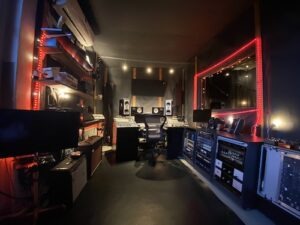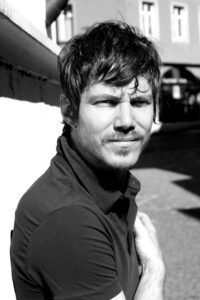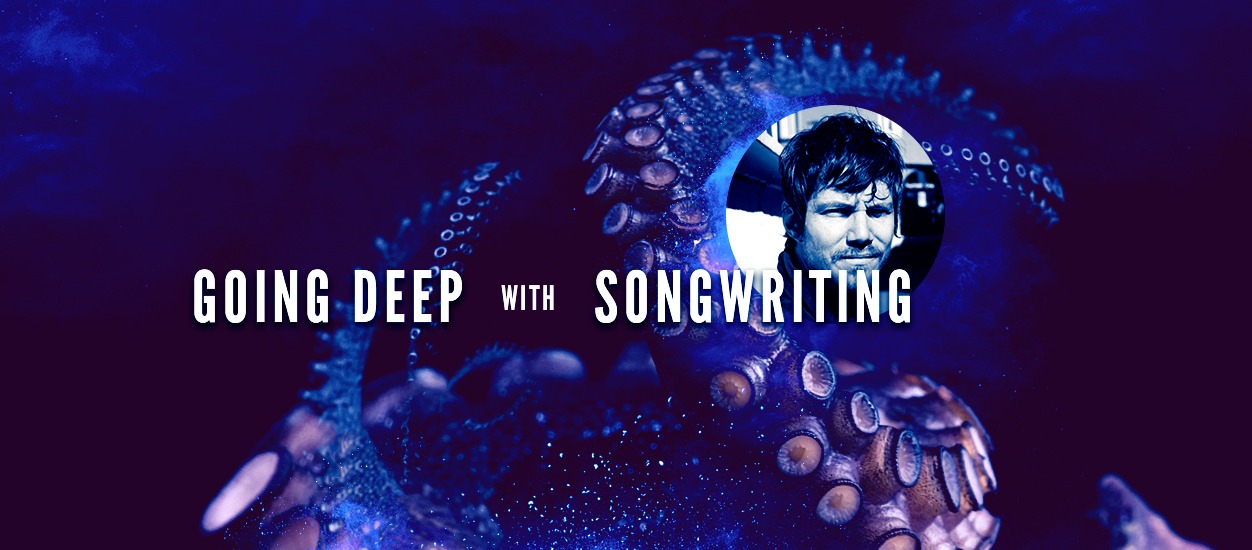Welcome back to the Going Deep series with Black Octopus Sound! This is the third installment. Be sure to check out the other two interviews covering Loudness in Mastering with Klaus Hill and Cutting Vinyl with Adi Flück!
Today we will be talking with someone that not only is a near and dear friend of mine, but also my partner and the owner of our studio Influx Studios. Luk Zimmermann is a multi-platinum awarded recording artist and songwriter, and has worked with some of Switzerland’s and Central Europe’s biggest hits; and with many others from around the world. Working as a prolific songwriter and record producer for many years gives him an upper hand in music production. Luk knows his way around the process of songwriting from front-to-back, so needless to say, I couldn’t think of a better person to talk to about what goes on ‘behind the scenes’ in songwriting for studio productions.
So, here you have it! Let’s dive deep into songwriting with Luk Zimmermann!
BOS: Let’s give the readers a bit of a description on what songwriting is and what it means to you. What other elements go into a song aside from the writing part, and why are they just as important?
Luk: Songwriting to me is the base of everything. It’s almost like a language on its own, and a way to express myself with music. Also, great songwriting makes my life as a producer so much easier, and if I struggle in the process of producing I almost always go back into songwriting and try to fix it there. There’s no EQ or compressor to fix a wrong chord. Having both hats on as a songwriter and a producer gives me the ability to really dive deep into the emotional and musical world of a song and makes it a success.
BOS: Songwriting is the life-force of music. It’s the backbone of what makes a song, a song (as you said here). What is the most important key element in songwriting?
Luk: I’m not a technical songwriter which means I’m not over analyzing theory stuff. The only analyzing I do is listening (to probably a million by now) songs and seeing how they work and how they don’t. It helps me trust my ears where they take me when I’m adding new chords, I know it was done in the best way possible. The most important thing is listening, and if you do that and you try not just copy any given chord progression out there, but instead you really try to connect your lyrics to the chords you hear when you sing the melody, then you’ll have a pretty good start into a great song.
BOS: When working on songwriting do you see it as ‘stage in the song creation process’. Or is it just part of a bigger picture, like blending the lines of a songs production or arrangement? Do you prefer to separate the process?
Luk: I prefer to start recording a song when the songwriting is done but as mentioned earlier, I don’t hesitate to go back to songwriting if needed, even during the production. I do everything to get the right chords, the right feeling for the song. The right emotion. If the chorus doesn’t open up, you can add something like a “big hit” sample and a crash cymbal, easy enough; but if there’s the wrong chord at the beginning of the chorus it won’t open up as it should. That one chord can change everything – it’s all about the chords and how they work together with the other elements.

BOS: Do you think theory is important for a songwriter? Or is it more about a feeling thing and having an ear for the music?
Luk: I think it helps but I would never tell anybody to go and learn the theory to write songs. I’m sure a lot of the biggest hits were written without any theory at all. Again: follow your ears. If you listen to what they tell you then thats your music theory book; that’s all you need. You will find Songs you can hardly tell why they work in music theory, but they sound great because a certain chord change just makes you feel a certain way (and it’s not explainable with pure music theory at all.)
BOS: When songwriting for different styles of music, do you approach it differently?
Luk: Not really. But, if someone asks me to write a blues song of course there’s maybe a couple of chords I’d prefer to use for a style like this. But in general, to be brutally honest: any chord progression can fit into any kind of song. It’s all about how it is performed to become that style.
BOS: On any given day when you are doing a songwriting session, what do you start with? Vocals? Instruments? Melody? Lyrics? What works best and why?
Luk: I always start with some chords but often when working with topliners they already have a melody so I will try to “jam” along with their melody trying to find the right chords (this means I’m basically just playing chords until I find the right ones). I often write in teams, which is amazing because it’s like cooking a nice meal together and everybody brings something to it. Their own touch in all areas. [*Sidenote: A topliner is someone that their entire purpose is to write the vocal melody for the vocals. Not lyrics. Not singing. Just the melody.]
BOS: Do you feel that songwriting is as important today as it used to be in the previous decades? If we compare songwriting in modern music to that of ‘golden years’ up until pop idols like Michael Jackson, and Elvis Presley, for example, do you think the techniques have changed?

Luk: I don’t think techniques have changed much. But I also have to admit that I don’t know how Elvis and Michael wrote their songs to be honest. The only thing I see is that today (especially big artists) rely on quite a number of songwriting team members, which means that when they start with a new record, they get hundreds of songs and they can pick the ones they like and what they want to work with. I was part of writing sessions like this a few times. There have always been songwriters writing songs for artists, even back in the 60ies and 70ies, and of course there have always been a lot of bands writing their own songs too.
BOS: Songwriting as a career is a thing. We have spoken about this many time in our work together. I think a lot of new up-n-comers in the music business do not realize that this can be a steady stream of income, and also, inspiration. How do you go about making it a career over time?
Luk: I think songwriting is probably the most stable income in music industry (on the creative side). We all know that songwriting income will stay the same more or less but income from live shows can break away completely, especially in pandemic times like this that we are in right now. Imagine you are getting older and tired of touring around all the time, where else can you turn?
I think the secret is the combination of all of it. If you rely on fees from lives shows only, then that might work for quite a while; but it’s a tough life. Not one everyone is made up for. I feel like I missed big parts of almost 15 years of my life because I was constantly on tour and away from my friends and family. I was away from songwriting!

BOS: We have seen a surge in songwriting camps over the recent years. Can you shed some light on what happens in a day-to-day session at a songwriting camp?
Luk: First of all, I really, really love songwriting sessions. The cool thing is you often meet people you’ve never seen before and you are just there in a room writing a song together for the first time, ever. And writing a song together is so much more than just composing; it’s often hours of quite philosophical discussions about what you are actually writing, and why; plus, it allows me to be on the fly moving along quickly and producing a song in one day. I like this one-day thing a lot because it doesn’t allow you to get lost in details or focus too much. You have to be quick with everything which doesn’t mean you can’t come back and fix stuff the next day, but I absolutely believe in the power of finishing stuff in one day and just letting it all out. We all know that it’s so easy to get lost in searching for the right synth sound (or kick drum); it can take weeks! (hah, just kidding… sort of). But really, it takes eats up valuable time if you focus too much. So be quick and then the songwriting will find its way to easily capture emotions, ideas, chords, and make them work.
BOS: What genre’s do you see benefit the most from songwriting? Do you think a genre like Techno or Dubstep is approached the same as Songwriting?
Luk: I rarely do techno songwriting but yes I think it’s a different approach. It’s often times less about chords and more about the movement, beats and sound sources.
BOS: How can Sample Packs and Presets play a role in Songwriting?
Luk: For me Sample Packs are the new synths and drum machines. They are super inspirational and I use them every day. They are my starting points for so many things and it’s so easy to switch through sounds and find the right kick, snare, synth, loop whatever, and then mess around with and make it YOUR sound by just adding distortion, reverb just what you need. People often think that it’s boring if everybody is using the same samples; but it’s not! You just have to make them YOURS, that’s all.. and that’s basically what you should do with everything in music and songwriting, just as much as producing and using sample packs: make it sound unique! Make it YOU! Then people will come back to you for your sound and will know you for your own unique touch!
Thank you so much to Luk Zimmerman for his time! You can check out Influx Studios HERE.
We have some other great “Going Deep” interviews in the pipeline! Until next time!
